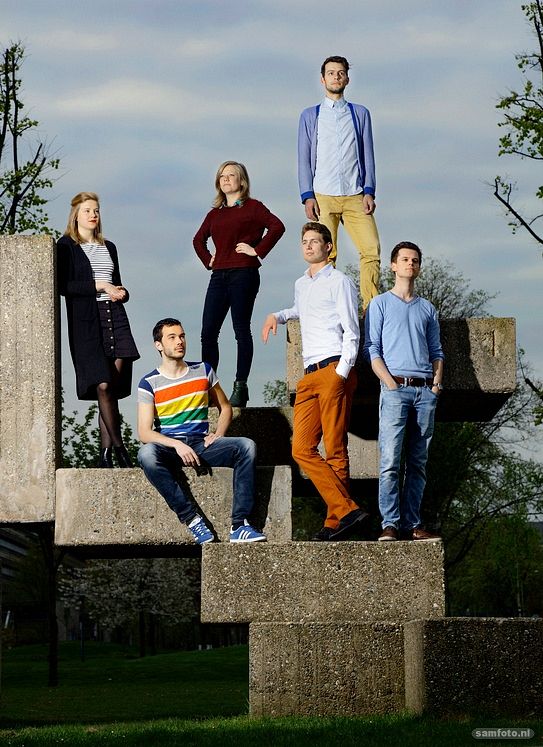Is education only about gaining knowledge? The student movement Bildung in Delft wants more than that. “At TU Delft we miss things like critical thinking and open mindedness,” said initiator Casper Hügel.
Van links naar rechts de initiatiefnemers: Laura Dijkink, Marten de Groot, Jolien van der Meché, Nard Duin (oranje broek), Casper Hügel (gele broek) en Steven Burger. (photo: Sam Rentmeester)
Bildung refers to the concept of German philosopher, linguist and diplomat Wilhelm von Humboldt who said ‘Bilde dich selbst’ which translates to ‘Work on yourself’ . Bildung is the opposite of Ausbildung, Hügel explains.
“Ausbildung is pretty much what we currently do at our university: educating you to become a specialist. Bildung is about broadening your view, becoming aware of who you are and what happens in the world around you and the way you position yourself within that world.”
According to Hügel, students at the Faculty of Aerospace Engineering are able to design, for example, an F16 jet fighter. “They are good at that, but are they aware of the consequences?,” asked Hügel. The same applies to automation and people losing their jobs. “Technology and society interact”, said Hügel. “If you are unaware of the implications of technology, you are a kind of a blind giant, my supervisor once told me. At TU Delft we are great in analysing and solving problems. But we are blind to reality and to implications of our work.”
Vision on Education
Director of Education and Student Affairs Timo Kos is disappointed to learn that students feel TU Delft is doing too little on personal and cultural development. He would like to do more as well. “We are working on it and we are pretty well underway embedding this in our education with the responsible innovation programme. We will emphasize it in our forthcoming Vision on Education. Although we do not use the word Bildung, we think students should be able to work on it. Responsible innovation and the ethical aspects of one’s profession are important issues,” he said.
‘We prefer learning by doing instead of learning by listening’
TU Delft offers courses on ethics, but these are not popular nor practical, according to Steven Burger of Bildung in Delft. “Students do not know how to apply ethics in other courses. It is seen as something separate. They do it to show that they have dealt with it.” Timo Kos points out that some faculties integrate ethics in other courses. He mentions that teachers could also use projects or assignments with ethical components in their courses.
Learning by doing
Is personal development not one’s own responsibility? Students can go to meetings organised by, for example, Studium Generale. “Content wise Studium Generale is quite alike, but passive and broadcasting”, said Burger. “We prefer active meetings which involve learning by doing instead of learning by listening.”
Learning by doing is exactly what happened during a workshop in March of Bildung in Delft. The theme was ‘Getting out of your bubble’. Participants were asked to reflect on theses such as ‘Meat production pollutes more than transport in terms of greenhouse gas emissions’. Together they had to find support for this thesis on the internet. That proved to be difficult. What sources to compare? Which countries? What kind of transport? Which websites are reliable? And, how do you to calculate carbon footprint? Quite a few participants changed from indicating that the thesis was true to saying they didn’t know. “You tend to pick what you like from the internet, but it is important to be open for new beliefs and to assess them”, said Burger .”You should not embrace them unconditionally.”
Other initiatives
So what would be needed at TU Delft? Is it courses, electives, minors or something else? Bildung in Delft will present a plan before the summer. “We are not even sure whether Bildung should be part of the curriculum”, said Burger. Similar initiatives like ‘De Bildung Academie’ in Amsterdam and ‘Ucademy’ in Breda have been founded by students themselves and exist outside of the curriculum.
At De Bildung Academie students of Universiteit van Amsterdam en Vrije Universiteit Amsterdam together with educators and teachers of all universities have developed open source modules about identity, persuasiveness, rebellion, art, religion, money, digitization, stuff and energy. They are being sponsored and have had a single grant from the Sirius Program of Platform Bèta Techniek. Participants pay 1,200 euros and will get a certificate, but no credits (ECTS).
At Ucademy students of Avans University of Applied Sciences have developed four modules themselves: power and control, self-confidence, creativity and inspiration, and intrinsic motivation. They teach participants themselves in four meetings of two and a half hours for each module. Lessons are free and students of Universities of Applied Sciences can earn credits.
In Delft the bildung movement, which consists of twenty to thirty students, would like to challenge students and staff to think about what exactly is needed. Are extracurricular activities such as committees the only way to develop yourself or are there other possibilities as well?
Kos thinks it is a great initiative and is looking forward to their ideas, both in and outside the curriculum. “I would like to ask Bildung in Delft also to advise the student unions and study associations to do more with it.”
Do you like to think about the role of university? Check out the series ‘The Role of TU Delft’ by TU Delft PhD-student Ali Haseltalab.
Do you have a question or comment about this article?
c.j.c.vanuffelen@tudelft.nl


Comments are closed.